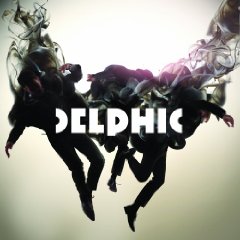Sometimes a song comes along that is so perfect that – short of the people responsible committing mass murder, declaring their allegiance to the BNP, selling their music to McDonalds or dating Peter Doherty / Kate Moss (delete as applicable) – you’ll forgive them almost anything, at least for a while. Delphic’s debut release, ‘Counterpoint’, was one such single. Vocalist James Cook had already seduced us with his curious enunciation of its title, "coun…. terpoint", but the track’s breathless urgency, its crystalline arpeggios, its enigmatic lyrics spinning between rapture and melancholy – "I’ll find my coun…terpoint inside a red room locked behind a door… / … Just tell me nothing’s wrong, nothing’s wrong, nothing’s wrong today" – combined with an effortlessly euphoric breakdown to send shivers up the spine. Even guitars that sounded suspiciously as though they might have been swiped from U2’s The Joshua Tree were amply compensated for by the way that Cook delivered his triumphant "today!"s at the song’s end.
Nine months later, Delphic seem to have arrived fully formed. Their rise to prominence has seen ‘Counterpoint’ released as the first single for the newly revitalised R&S label and the video for its follow-up ‘This Momentary’ – shot in the shadows of the Chernobyl nuclear power plant in Russia – justifiably nominated for four UK Music Video Awards. They’ve opened for the likes of Bloc Party and Orbital, persuaded renowned DJ/producer/remixer Ewan Pearson to act as their producer, and ended 2009 with the dubious pleasure of BBC Sound of 2010 coverage. And though, in keeping with their name, they’ve done their best to remain out of the spotlight – they refused to appear in any of their three promotional videos so far – their live show demonstrates a band eager to play big stages with bigger light shows and even bigger sound.
So now, as we enter 2010, they deliver Acolyte, primed for commercial success, ready to show those of us who like both kinds of music – indie and dance – the way forward. Expectations are high but the ghosts of bands like EMF and The Soup Dragons litter the path behind them. Fortunately, for the most part, Delphic do not disappoint. Quite apart from ‘Counterpoint’ there’s opener ‘Clarion Call’, as well named a song as one will find here, which starts out gently enough but then halfway through explodes into pounding, epic pop until its sudden, almost premature, ending. The album’s title track, in contrast, offers a full nine minutes of sparkling brilliance, engineered for clubs and stadia alike, while ‘Submission’ initially appears as polite as an early Pet Shop Boys single but refuses to contain the excitement bubbling at its core. The confidence with which they write and perform denies that this is a band who have decided to lever beats into their modus operandi through clever use of a producer. Instead, in the words of those bands desperate to impress in the late 80s and early 90s, you actually believe that there has always been a dance element to their music.
Of course, to reiterate another phrase from around the same time, pop will eat itself, and there’s no doubt that Delphic owe a great debt to two of the biggest acts to have mastered the crossover aesthetic. Current single ‘Doubt’ sports guitars and programmed keyboards that are a dead ringer for Technique-era New Order, while earlier single ‘This Momentary’ doffs its cap respectfully to Second Toughest In The Infants-era Underworld as it unexpectedly steps sideway into a world of clattering drums and the repeated exhortation to "do something, really something, let’s do something real". These aren’t the only times that Delphic give away their influences, if truth be told: ‘Red Lights’, one of the album’s weaker tracks (if only for its mildly hackneyed lyrics) also leans heavily on both bands, and closing track ‘Remain’, with its hints of lush house, sounds as though it could have soundtracked an ecstasy-fuelled Ibizan sunrise in the early ’90s. There are hints too of prime Orbital but, thanks in part to Ewan Pearson, Delphic do not sound in thrall to any of their influences: his experience as a DJ ensures the band remain relevant to contemporary club culture, while his love for Shep Pettibone’s pioneering integration of house music with pop guarantees that the beats are as potent as the melodies.
Whether Acolyte is quite the slice of pop perfection that ‘Counterpoint’ promised is something only time will tell. Right now the thrill of hearing a record so irresistibly fresh and invigorating for the most part masks its weaknesses. Those for whom Delphic’s reference points are either sacred cows or bête noires may take issue with their magpie approach, but this is an album that looks forward relentlessly even if it sometimes provokes bursts of nostalgia. It may not be perfect, and its roots may show a little, but every great debut album reveals its vulnerabilities after a while. Acolyte is a 21st Century pop record that builds on the foundations of its creators’ inspirations rather than merely reconstructing them and, warts and all, the result is a sound that is definably Delphic.


